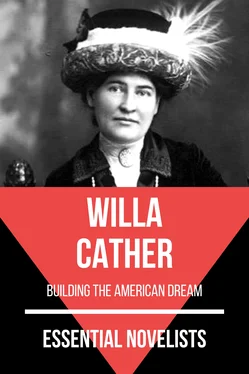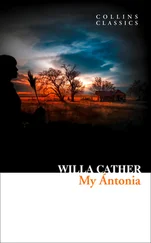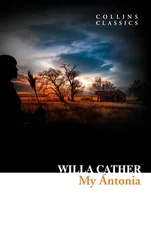Title Page
Author
O Pioneers!
Death Comes for the Archbishop Конец ознакомительного фрагмента. Текст предоставлен ООО «ЛитРес». Прочитайте эту книгу целиком, купив полную легальную версию на ЛитРес. Безопасно оплатить книгу можно банковской картой Visa, MasterCard, Maestro, со счета мобильного телефона, с платежного терминала, в салоне МТС или Связной, через PayPal, WebMoney, Яндекс.Деньги, QIWI Кошелек, бонусными картами или другим удобным Вам способом.
About the Publisher Конец ознакомительного фрагмента. Текст предоставлен ООО «ЛитРес». Прочитайте эту книгу целиком, купив полную легальную версию на ЛитРес. Безопасно оплатить книгу можно банковской картой Visa, MasterCard, Maestro, со счета мобильного телефона, с платежного терминала, в салоне МТС или Связной, через PayPal, WebMoney, Яндекс.Деньги, QIWI Кошелек, бонусными картами или другим удобным Вам способом.

WILLA CATHER, (born December 7, 1873, near Winchester, Virginia, U.S.—died April 24, 1947, New York City, New York), American novelist noted for her portrayals of the settlers and frontier life on the American plains.
At age 9 Cather moved with her family from Virginia to frontier Nebraska, where from age 10 she lived in the village of Red Cloud. There she grew up among the immigrants from Europe—Swedes, Bohemians, Russians, and Germans—who were breaking the land on the Great Plains.
At the University of Nebraska she showed a marked talent for journalism and story writing, and on graduating in 1895 she obtained a position in Pittsburgh, Pennsylvania, on a family magazine. Later she worked as copy editor and music and drama editor of the Pittsburgh Leader. She turned to teaching in 1901 and in 1903 published her first book of verses, April Twilights. In 1905, after the publication of her first collection of short stories, The Troll Garden, she was appointed managing editor of McClure’s, the New York muckraking monthly. After building up its declining circulation, she left in 1912 to devote herself wholly to writing novels.
Cather’s first novel, Alexander’s Bridge (1912), was a factitious story of cosmopolitan life. Under the influence of Sarah Orne Jewett’s regionalism, however, she turned to her familiar Nebraska material. With O Pioneers! (1913) and My Ántonia (1918), which has frequently been adjudged her finest achievement, she found her characteristic themes—the spirit and courage of the frontier she had known in her youth. One of Ours (1922), which won the Pulitzer Prize, and A Lost Lady (1923) mourned the passing of the pioneer spirit.
Cather’s will erected strong protections around her intellectual property, preventing adaptations of her fiction and forbidding publication of her correspondence. However, upon the 2011 death of a nephew who had served as her last designated executor, copyright of her work passed to the Willa Cather Trust. The trust—a partnership of the Willa Cather Foundation, Cather’s remaining family, and the University of Nebraska Foundation—lifted the prohibitions on publishing her letters.
Though Cather had destroyed much of her own epistolary record, nearly 3,000 missives were tracked down by scholars, and 566 were collected in The Selected Letters of Willa Cather (2013).

––––––––

––––––––

ONE JANUARY DAY, THIRTY years ago, the little town of Hanover, anchored on a windy Nebraska tableland, was trying not to be blown away. A mist of fine snowflakes was curling and eddying about the cluster of low drab buildings huddled on the gray prairie, under a gray sky. The dwelling-houses were set about haphazard on the tough prairie sod; some of them looked as if they had been moved in overnight, and others as if they were straying off by themselves, headed straight for the open plain. None of them had any appearance of permanence, and the howling wind blew under them as well as over them. The main street was a deeply rutted road, now frozen hard, which ran from the squat red railway station and the grain “elevator” at the north end of the town to the lumber yard and the horse pond at the south end. On either side of this road straggled two uneven rows of wooden buildings; the general merchandise stores, the two banks, the drug store, the feed store, the saloon, the post-office. The board sidewalks were gray with trampled snow, but at two o'clock in the afternoon the shopkeepers, having come back from dinner, were keeping well behind their frosty windows. The children were all in school, and there was nobody abroad in the streets but a few rough-looking countrymen in coarse overcoats, with their long caps pulled down to their noses. Some of them had brought their wives to town, and now and then a red or a plaid shawl flashed out of one store into the shelter of another. At the hitch-bars along the street a few heavy work-horses, harnessed to farm wagons, shivered under their blankets. About the station everything was quiet, for there would not be another train in until night.
On the sidewalk in front of one of the stores sat a little Swede boy, crying bitterly. He was about five years old. His black cloth coat was much too big for him and made him look like a little old man. His shrunken brown flannel dress had been washed many times and left a long stretch of stocking between the hem of his skirt and the tops of his clumsy, copper-toed shoes. His cap was pulled down over his ears; his nose and his chubby cheeks were chapped and red with cold. He cried quietly, and the few people who hurried by did not notice him. He was afraid to stop any one, afraid to go into the store and ask for help, so he sat wringing his long sleeves and looking up a telegraph pole beside him, whimpering, “My kitten, oh, my kitten! Her will fweeze!” At the top of the pole crouched a shivering gray kitten, mewing faintly and clinging desperately to the wood with her claws. The boy had been left at the store while his sister went to the doctor's office, and in her absence a dog had chased his kitten up the pole. The little creature had never been so high before, and she was too frightened to move. Her master was sunk in despair. He was a little country boy, and this village was to him a very strange and perplexing place, where people wore fine clothes and had hard hearts. He always felt shy and awkward here, and wanted to hide behind things for fear some one might laugh at him. Just now, he was too unhappy to care who laughed. At last he seemed to see a ray of hope: his sister was coming, and he got up and ran toward her in his heavy shoes.
Читать дальше
















